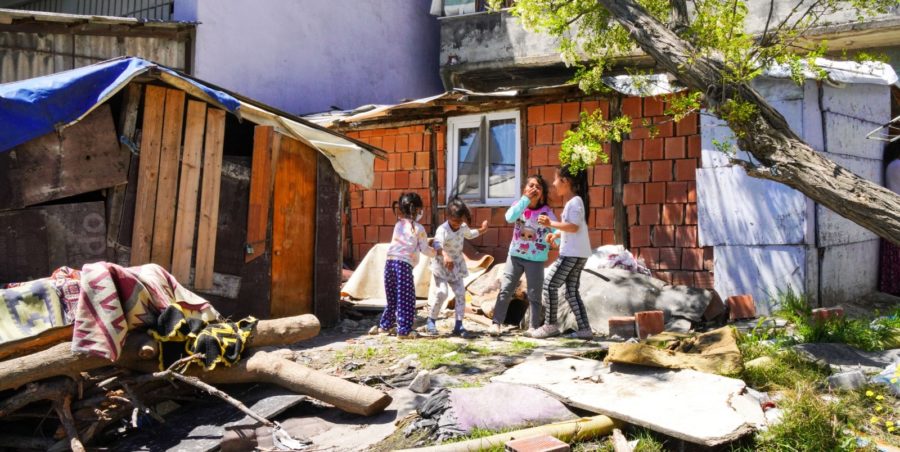
Deep Poverty Network (Derin Yoksulluk Ağı), established by the Open Space Association (Açık Alan Derneği), is receiving grant and capacity development support from our Institutional Fund to improve its advocacy and monitoring & evaluation capacity while combating deep poverty in Turkey.
Read below our interview:
You have recently published the Decriminalisation of Poverty report. Can you tell us about the prominent findings of the report and your solution recommendations?
We prepared the Decriminalisation of Poverty report in response to the call for contributions to the joint report “Decriminalisation of Homelessness and Extreme Poverty” by the United Nations Special Rapporteur on the Right to Adequate Housing and the United Nations Special Rapporteur on Extreme Poverty and Human Rights. The prominent findings of the report were as follows: The Law on Misdemeanours, the purpose of which is to “protect public order, public morality, public health, the environment and economic order”, prohibits begging, eating, sleeping, engaging in personal hygiene activities and peddling in public spaces due to poverty. When we examine the implementation of this law, we see that people are being detained without any trial processes and fines are being imposed and the law is criminalising poverty rather than preventing it. These practices also violate Article 7 of the European Convention on Human Rights; Article 2 of the International Covenant on Civil and Political Rights; Articles 8 and 11 of the International Covenant on Economic, Social and Cultural Rights; and Article 25 of the Universal Declaration of Human Rights.
In addition, the Prime Ministry’s circular in 2014 ordering the forced return of migrants who are caught begging on the streets, and the criminalisation of paper collecting after the Istanbul Governorate’s press release in 2021 are practices that violate the right to work and the European Convention on Human Rights, which states that penalties cannot be applied arbitrarily. Our suggestion to this situation is to consider activities such as begging, peddling, sleeping, and paper collecting in public spaces as indicators of poverty instead of penalising them, and to develop adequate services to prevent poverty.
The recent increase in the prices of basic needs including heating, electricity and water, strikes by workers, and suicide news of people living in deep poverty conditions are among the most frequent news we encounter.
You publish your weekly media monitoring on poverty. Can you tell us about the purpose of this media monitoring and the types of news you come across most frequently?
With weekly media monitoring, we aim to follow the poverty agenda in Turkey and make it visible. We compile news articles and regularly share them on our website to increase the visibility of rights violations caused by poverty and studies conducted in the field of poverty. The recent increase in the prices of basic needs including heating, electricity and water, strikes by workers who cannot access adequate living conditions, and suicide news of people living in deep poverty conditions are among the most frequent news we encounter.
Can you tell us about your recent advocacy work to draw attention to the issue of poverty? Why is it important to advocate in this field?
Recently, we submitted reports to the Council of Europe and the United Nations Committee on the Rights of the Child on child poverty in Turkey. With these reports, we tried to make child poverty visible through social media and the press. As a result of our advocacy efforts, children who cannot attend school due to lack of access to lunch came to the agenda of the parliament. MP Gülistan Kılıç submitted a law proposal on the provision of lunch support in schools. In addition, we aimed to make visible the violations of rights experienced by people living in deep poverty with the book “Absent Stories“. We published an information note against the increasing pressure and punishment processes against paper collectors and sent it to MPs, local governments and media organisations.
With this support, we believe that our advocacy and monitoring capacity will be improved, we will contribute to policymaking, propose solutions, and make visible the violations of rights caused by poverty.
Which capacity development areas are you focusing on with the grant support of our Institutional Fund?
We will focus on advocacy and monitoring & evaluation. We aim to plan our advocacy activities, specify our demands and suggestions for decision-makers in preventing poverty, create a contact list for lobbying activities, plan for monitoring the practices of local governments and central government, regularly publish information notes, and advocate for increasing the visibility of poverty from a human rights perspective. Within the scope of monitoring and evaluation, we plan to conduct monitoring to assess the effectiveness of the Deep Poverty Network’s activities and then evaluate the activities.
This is the second time you have received grants and capacity development support from our Institutional Fund. Considering your past experiences, what kind of contributions do you think receiving this type of core funding for two consecutive years will make to your association?
Thanks to the core grant and capacity-building support we received last year, we have taken important steps towards ensuring the financial sustainability of our association. With the development of our fundraising capacity, the number of households we support has increased. With this support, we believe that our advocacy and monitoring & evaluation capacity will be improved, we will contribute to policymaking in the field of poverty, propose solutions, develop effective advocacy strategies for decision-makers and make visible the violations of rights caused by poverty.
About Deep Poverty Network
Deep Poverty Network, established by the Open Space Association in March 2020, has been working on disadvantaged families’ access to basic needs, such as food, hygiene products and baby supplies by determining these needs through field visits. Open Space Association carries out activities in the fields of socio-cultural empowerment and poverty, conducts field research to advocate for eliminating poverty, and organises workshops and training programs with a rights-based perspective.



